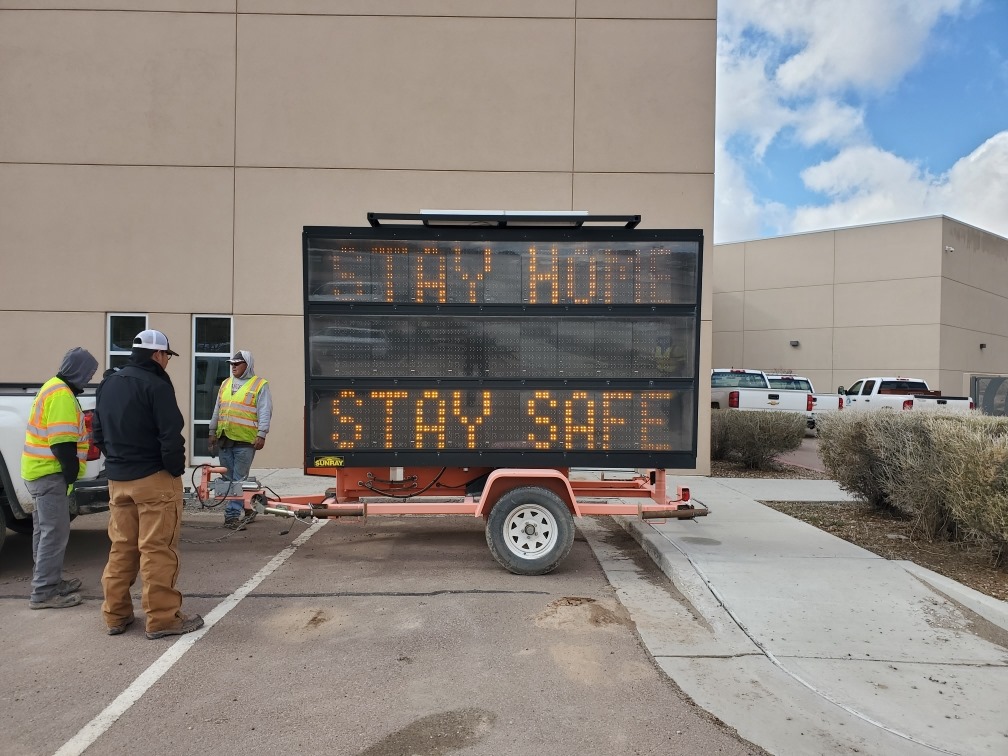
- Details
- By Native News Online Staff
WINDOW ROCK, Ariz. — The Navajo Nation has extended the Stay-At-Home order requiring all residents to remain at home 24-hours, seven days a week, with the exceptions of essential workers that must report to work, emergency situations, to obtain essential food, medication, and supplies, tend to livestock, outdoor exercising within the immediate vicinity of your home, wood gathering and hauling with a permit.
The extension was part of a new public health emergency order that goes into effect Monday, January 25, 2021. The new order also calls for vaccinations to be administered on weekends.
This action is required to help stop the spread of Covid-19, the deadly virus that has claimed 973 lives on the Navajo Nation since last March.
“We’ve come a long way in this battle against Covid-19 and thanks to the public health experts and frontline warriors, we are making great progress, but we have to keep our guard up to overcome it, Navajo Nation Jonathan Nez said.
“We will overcome Covid-19 and each of us has a part to play. Our people have begun to receive the hardship assistance checks. We ask you to please be responsible and use the funds for essential services and items for your loved ones to help during this pandemic and please do not travel to border towns and put yourselves at risk of exposure to Covid-19. Please stay home as much as possible, wear a mask in public, avoid in-person gatherings, practice social distancing, and wash your hands,” Nez continued.
On Sunday, the Navajo Department of Health, in coordination with the Navajo Epidemiology Center and the Navajo Area Indian Health Service, reported 133 new Covid-19 positive cases for the Navajo Nation and seven more deaths. The total number of deaths is now 973 as of Sunday. Reports indicate that 14,053 individuals have recovered from Covid-19, and 228,384 Covid-19 tests have been administered. The total number of positive Covid-19 cases is now 27,484.
Navajo Nation Covid-19 positive cases by Service Unit:
- Chinle Service Unit: 5,077
- Crownpoint Service Unit: 2,722
- Ft. Defiance Service Unit: 3,031
- Gallup Service Unit: 4,383
- Kayenta Service Unit: 2,490
- Shiprock Service Unit: 4,760
- Tuba City Service Unit: 3,240
- Winslow Service Unit: 1,745
* 36 residences with Covid-19 positive cases are not specific enough to place them accurately in a Service Unit.
On Sunday, the state of Arizona reported 7,217 new cases, Utah reported 1,516, and New Mexico reported 635 new cases. The Navajo Nation’s 57-hour weekend lockdown is in effect until Monday, Jan. 25, 2021 at 5:00 a.m. (MST). All Navajo Nation residents are required to remain home for the duration of the 57-hour weekend lockdown, with the exception of essential workers who are required to report to work and cases of emergencies.
often with soap and warm water,” said Navajo Nation President Jonathan Nez.
The new Public Health Emergency Order also includes the following provisions:
- Implements a daily curfew from 9:00 p.m. (MST) until 5:00 a.m. (MST) seven days a week.
- Essential businesses may operate between the hours of 7:00 a.m. (MST) and 8:00 p.m. (MST) daily, including gas stations, grocery stores, convenience stores, hardware stores, laundromats, restaurants, food establishments, banks and similar financial institutions, and hay vendors, provided they comply with provisions outline in the order to help protect employees and the public from Covid-19.
- Refrain from gathering with individuals from outside your immediate household and requiring all residents to wear a mask in public, avoid public gatherings, maintain social (physical) distancing, remain in your vehicle for curb-side and drive-through services.
For more information, including helpful prevention tips, and resources to help stop the spread of Covid-19, visit the Navajo Department of Health's Covid-19 website: http://www.ndoh.navajo-nsn.gov/Covid-19. For Covid-19 related questions and information, call (928) 871-7014.
More Stories Like This
Native News Weekly (August 25, 2024): D.C. BriefsUS Presidents in Their Own Words Concerning American Indians
Ethics Complaint Alleges Former Navajo Nation Chief of Staff Accepted Gifts From Contractor
Monday Morning (December 14, 2025): Articles You May Have Missed This Past Weekend
Senators Demand Accountability Amid Reports of ICE Questioning Native Americans
Help us defend tribal sovereignty.
At Native News Online, our mission is rooted in telling the stories that strengthen sovereignty and uplift Indigenous voices — not just at year’s end, but every single day.
Because of your generosity last year, we were able to keep our reporters on the ground in tribal communities, at national gatherings and in the halls of Congress — covering the issues that matter most to Indian Country: sovereignty, culture, education, health and economic opportunity.
That support sustained us through a tough year in 2025. Now, as we look to the year ahead, we need your help right now to ensure warrior journalism remains strong — reporting that defends tribal sovereignty, amplifies Native truth, and holds power accountable.
 The stakes couldn't be higher. Your support keeps Native voices heard, Native stories told and Native sovereignty defended.
The stakes couldn't be higher. Your support keeps Native voices heard, Native stories told and Native sovereignty defended.
Stand with Warrior Journalism today.
Levi Rickert (Potawatomi), Editor & Publisher

